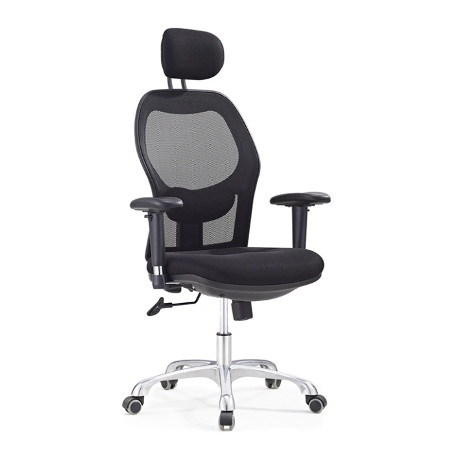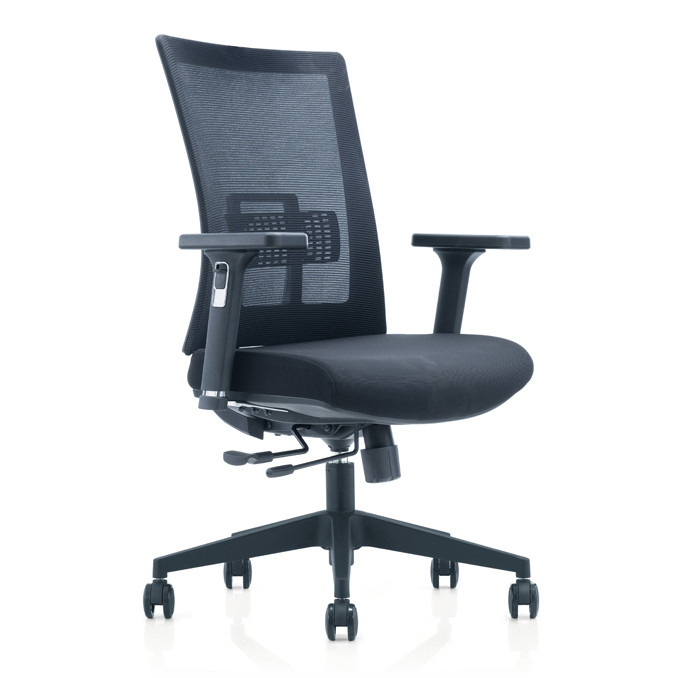
Choosing the Right Chair Armrests: Fixed vs. Adjustable
Introduction
When selecting an office chair, comfort and support are crucial, and one of the often-overlooked factors in achieving this is the armrests. Chair armrests not only provide comfort but also promote proper posture, reduce strain, and help maintain focus throughout the day. Fixed and adjustable armrests each offer unique benefits, depending on your needs and workspace. This guide will help you weigh the pros and cons of fixed vs. adjustable armrests, so you can choose the best option for your office chair and work environment.
1. What Are Fixed Armrests?
Fixed armrests are stationary and cannot be adjusted. They are typically mounted directly onto the chair’s frame and stay in the same position regardless of how the user moves or changes their posture. These armrests provide consistent support in a fixed position, which is ideal for individuals who don’t frequently adjust their seating position or prefer less customization.
2. Advantages of Fixed Armrests
Fixed armrests offer simplicity and durability. Because they don’t have moving parts, they tend to last longer and require less maintenance. Additionally, they provide stable support and are a reliable choice for those who don't need constant adjustments.
3. Disadvantages of Fixed Armrests
One significant downside to fixed armrests is the lack of customization. The arms are set at a specific height and width, which may not suit every user’s body type or personal comfort preferences. For individuals with varying tasks or ergonomic needs, fixed armrests can cause strain over long hours.
4. What Are Adjustable Armrests?
Adjustable armrests, as the name suggests, can be customized to various heights, widths, and angles, allowing users to modify them to their preference. This flexibility is particularly beneficial for people who spend long hours at their desks and need to adapt their setup for maximum comfort.
5. Advantages of Adjustable Armrests
The most obvious advantage of adjustable armrests is their adaptability. By adjusting the height, width, and angle, you can align the armrests to suit your body, promoting better posture and reducing strain on your arms, shoulders, and neck. This feature is especially helpful for users who alternate between tasks like typing, writing, or talking on the phone.
6. Disadvantages of Adjustable Armrests
The main drawback of adjustable armrests is that they can add complexity and cost to a chair. More moving parts mean more potential for wear and tear over time. Additionally, if not adjusted correctly, adjustable armrests can lead to discomfort or even contribute to poor posture.
7. Why Choose Fixed Armrests?
If you’re looking for a chair that’s easy to use and requires minimal adjustments, fixed armrests might be your best option. They are ideal for individuals who have a consistent work posture and prefer simplicity. Fixed armrests are also generally sturdier and require less maintenance than adjustable ones.
8. Why Choose Adjustable Armrests?
If you find yourself frequently adjusting your chair throughout the day or need the ability to fine-tune your seating position for comfort, adjustable armrests are a great option. They can help reduce pressure on your arms and shoulders, making them a suitable choice for people with specific ergonomic needs or those who spend long hours sitting at their desk.
9. Fixed vs. Adjustable: Which is Better for Your Body?
The right choice depends largely on your body type and how you work. If you have broader shoulders or longer arms, adjustable armrests may allow you to find a more comfortable position. However, if you prefer a more streamlined chair with fewer moving parts, fixed armrests might be sufficient for your needs.
10. Impact of Armrest Height on Posture
Armrest height plays a vital role in overall posture. With adjustable armrests, you can align the armrests to your preferred height, ensuring that your arms are supported at a comfortable angle. Fixed armrests, on the other hand, may not provide the right support for every user and can lead to discomfort if they are too high or too low.
Additional Considerations for Choosing the Right Armrest Type
-
Ergonomics and Health Concerns
Proper armrest height and positioning can prevent common ailments such as shoulder, neck, and wrist strain. Adjustable armrests offer the flexibility needed to adjust to various postures, whereas fixed armrests might not accommodate the full range of ergonomic needs. -
Space and Desk Setup
Consider the amount of space you have on your desk. Adjustable armrests may take up more room, especially when they are extended, while fixed armrests typically don’t interfere as much with workspace layout. -
Chair Stability
When choosing between fixed and adjustable armrests, consider the overall stability of the chair. Chairs with adjustable armrests may be more prone to wobbling or wear over time, while fixed armrests provide a more stable and secure feel. -
Budget Considerations
Adjustable armrests often increase the cost of a chair. If you’re on a budget, fixed armrests might offer the best value for money while still providing essential support. -
Work Style and Posture Habits
If your work requires frequent movement or task changes, adjustable armrests allow you to make quick adjustments. However, if your posture remains relatively consistent, fixed armrests may suffice and offer a more cost-effective solution. -
Quality of Materials
Look for high-quality materials in both fixed and adjustable armrests. Well-built armrests, whether adjustable or fixed, provide more comfort and durability. Materials like padded armrests can add an extra layer of comfort. -
Range of Adjustability
When opting for adjustable armrests, check the range of adjustments available. Some chairs offer a wider range of movement, while others may have limited flexibility. A greater range ensures better customization to meet your ergonomic needs. -
Long-Term Use
If you're looking for a chair that will last for years, consider how the armrests may wear over time. Fixed armrests may endure wear longer, while adjustable armrests might need maintenance or occasional repairs due to more moving parts. -
Aesthetic Preferences
The design of your armrests can also influence the overall aesthetic of your chair. Adjustable armrests might look more modern, while fixed armrests offer a more streamlined and simple design. -
The Role of Armrests in Chair Comfort
Ultimately, the role of armrests is to provide comfort and promote better posture. The choice between fixed and adjustable armrests should be based on how they align with your unique comfort preferences, workstation setup, and body type.
Recommended Products

-
Mujaan Mesh High Back Ergonomic Chair
A versatile mesh chair offering both comfort and durability with adjustable armrests, perfect for customized support.
-
Sujaan Mesh Low Back Ergonomic Chair
Ideal for compact workspaces, this chair provides reliable mesh support and adjustable armrests for improved ergonomics.
Final Thoughts
Choosing the right armrests—whether fixed or adjustable—can significantly affect your comfort and productivity. While fixed armrests offer simplicity and durability, adjustable armrests allow you to tailor your seating position for optimal support and comfort. The decision should be based on your personal preferences, work habits, and ergonomic needs. Remember, a well-chosen chair, like the Mujaan and Sujaan, can transform your workspace and support long-term well-being.
FAQ
Are adjustable armrests necessary for comfort?
Adjustable armrests are not essential for everyone, but they can significantly improve comfort by allowing you to tailor the armrest height to your body.Can I adjust fixed armrests on my chair?
No, fixed armrests are stationary and cannot be adjusted. You would need to choose a chair with adjustable armrests if customization is important.How do I know if my armrests are at the correct height?
Your armrests should allow your elbows to remain at a 90-degree angle while sitting. Adjust them (if adjustable) so that your arms are supported without straining your shoulders.Which type of armrests last longer?
Fixed armrests generally last longer because they have fewer moving parts, whereas adjustable armrests can wear out faster due to the extra mechanisms involved.


